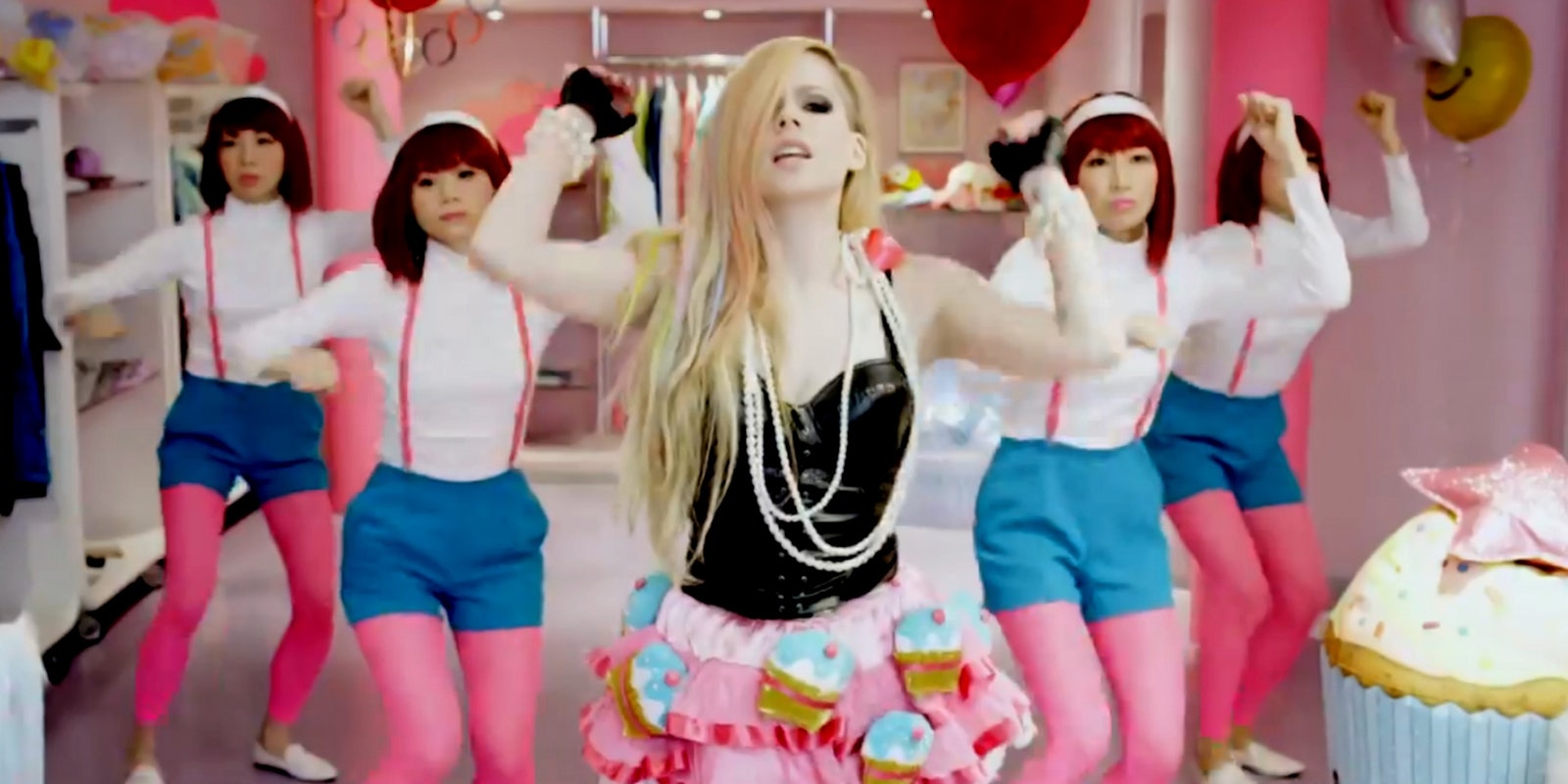To watch a new Avril Lavigne video in 2014 is a strange and unsettling experience. If you needed to be reminded that Lavigne hasn’t been popular in nearly a decade, her newest video is an overt callback to the bygone days of 2004, when the Canadian pop-punk songstress’ “My Happy Ending” went platinum and teenage girls with too many feelings still dressed like Samarra from The Ring.
2004 was also the same year that Gwen Stefani released Love Angel Music Baby, and it’s clear with “Hello Kitty” (yes, that’s actually the title of the song) that Lavigne wants what Stefani was having 10 years ago. The video is a sugar-addled smorgasbord of cultural appropriation, all Lavigne shouting “Arigato!” while a squadron of zombie-eyed, off-brand Harajuku girls dance in the background.
Even more than being the worst new release of the week, “Hello Kitty” offers a sober reminder that the nostalgia window is shrinking, the amount of time that passes before we’re allowed to wistfully mourn for it. The rule used to be that nostalgia cycles ever 40 years, but Entertainment Weekly’s Keith Staskiewicz argued that with the return the American Pie franchise, it’s becoming more like 15.
In 2014, even that estimate looks optimistic. This year will see the 10-year reunion of Mean Girls, a cultural phenomenon that hasn’t just taken over the Internet; it is the Internet. As the film approaches its 10th birthday next month, the coverage is becoming increasingly frenzied and breathless, as the blogosphere scrambles to milk the most clicks out of its beloved memory.
Like looking through an old yearbook, it’s a way to reminisce about old times, like Alvy Singer and Annie Hall, but also to mark time’s passage. It’s an innate statement of budding mortality, the first chance many Millennials will have to reach a cultural milestone that means something to them. For some, that was last year’s Postal Service reunion, as the band celebrated a decade of Give Up, their seminal 2003 record, and others may have felt that twinge after Eternal Sunshine of the Spotless Mind turned 10 in March.
To those who have seen a few anniversaries come and go, longing for the era of Gwen Stefani and ironic VH1 countdown shows may sound as strange as the idea of being nostalgic for rattails or oversize grandma glasses, both of which have become staples of hipster culture. The Internet age is completely thrown out the rules on how time feels to us, so much so that Facebook is cashing in on 2014 nostalgia by letting users create a timeline of the past year. No moment is too recent to idealize.
In Noah Baumbach’s Kicking and Screaming, Max (played by Chris Eigeman) comments on our ability to make even the present moment appear gauzy enough to idealize in our hallowed memories. “I’m nostalgic for conversations I had yesterday,” Max says. “I’ve begun reminiscing events before they even occur. I’m reminiscing this right now. I can’t go to the bar because I’ve already looked back on it in my memory, and I didn’t have a good time.”
The Japanese call it “mono no aware,” defined as an awareness of the innate impermanence of things, a gentle sadness about the passage of time, and soldiers used to view this feeling as “a disease and a form of depression.” Considered a sickness, they thought too much nostalgia could kill you.
But modern researchers argue that nostalgia, when applied correctly, can be a palliative to counteract “loneliness, boredom and anxiety.” According to the University of Southampton’s Dr. Constantine Sedikides, the experience of treasured memories can help couples bond or make people feel more like a part of their community. In an interview with the New York Times, Dr. Sedikides said, “Nostalgia makes us a bit more human.”
In a piece on the resurgence of Mad Men and our culture of Throwback Thursdays, NPR’s Brenda Salinas argued that the current wave of nostalgia in American culture—from the Teenage Mutant Ninja Turtles reboot to a Mrs. Doubtfire sequel—is a product of wishful thinking.
“We like retro things because we are holding on to a romanticized vision of an earlier time,” Salinas claimed. “It’s like playing dress-up—‘new’ old technologies help us pretend that everything about that earlier era was simple and good.”
But in the Internet age, nostalgia also offers a statement about who we are, based on who we used to be—the seemingly arbitrary fact that we used to like Evanescence in 2002, before our siblings showed us Kate Bush. It’s both a timeline and the creation of a shared space of identity, a way to find yourself on a digital map.
There’s a reason that pop culture surveys—like our favorite bands by state—often indicate that Americans are stuck listening to the bands of yesterday, as Kentucky remains a Fall Out Boy state and West Virginia went solidly for Matchbox Twenty. As our geographies become more digital and diffuse, people need a way to make sense of their environments, both past and present. It’s Identity Porn.
It’s strange to think about Hinder or Linkin Park, staples of the mid-2000s post-grunge scene, being a statement of anyone’s identity in 2014. But that’s the thing about the past: Wanting the trappings of your late adolescence back doesn’t necessarily have to adhere to logic, and in the case of Avril Lavigne, hitting the replay button allows you to rewrite your own history.
What’s so strange about “Hello Kitty” isn’t that Lavigne wants to inhabit the past, like a high-school time travel movie, but that she wants to relive someone else’s. But if her video is any indication, the danger of nostalgia is that you might find that what you were longing for only looks good when it’s posted on your Facebook timeline. Everything looks a lot better in the Instagram filter of memory.
Photo via “Hello Kitty” video/Avril Lavigne
